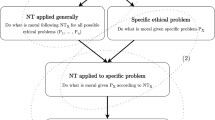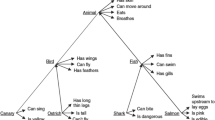Abstract
There is a prevalent notion among cognitive scientists and philosophers of mind that computers are merely formal symbol manipulators, performing the actions they do solely on the basis of the syntactic properties of the symbols they manipulate. This view of computers has allowed some philosophers to divorce semantics from computational explanations. Semantic content, then, becomes something one adds to computational explanations to get psychological explanations. Other philosophers, such as Stephen Stich, have taken a stronger view, advocating doing away with semantics entirely. This paper argues that a correct account of computation requires us to attribute content to computational processes in order to explain which functions are being computed. This entails that computational psychology must countenance mental representations. Since anti-semantic positions are incompatible with computational psychology thus construed, they ought to be rejected. Lastly, I argue that in an important sense, computers are not formal symbol manipulators.
Similar content being viewed by others
References
Anderson, J. R.: 1976,Language, Memory, and Thought, Lawrence Erlbaum, Hillsdale, N.J.
Anderson, J. R.: 1983,The Architecture of Cognition, Harvard University Press, Cambridge, MA.
Block, N. J. (ed.): 1981,Imagery, Bradford/MIT, Cambridge, MA.
Cummins, Robert: 1975, ‘Functional Analysis’,The Journal of Philosophy 72, 741–760.
Cummins, Robert: 1983,The Nature of Psychological Explanation Bradford/MIT, Cambridge, MA.
Devitt, M.: 1981,Designation. Columbia University Press, New York.
Dietrich, E. and C. Fields: 1986, ‘Creative Problem Solving Using the Wanton Inference Strategy’, inProceedings of the First Annual Rocky Mountain Conference on Artificial Intelligence.
Dretske, Fred: 1981,Knowledge and the Flow of Information, Bradford/MIT, Cambridge, MA.
Dretske, Fred: 1985, ‘Machines and the Mental’,Proceedings and Addresses of the American Philosophical Association, Vol. 59(1), Sept. 1985.
Fodor, Jerry: 1975,The Language of Thought, Cornell, New York.
Fodor, Jerry: 1980, ‘Methodological Solipsism Considered as a Research Strategy in Cognitive Psychology’,The Behavioral and Brain Sciences 3.
Fodor, Jerry: 1981,Representations, Bradford/MIT, Cambridge, MA.
Fodor, Jerry: 1984, ‘Semantics Wisconsin Style’,Synthese 59, 231–50.
Fodor, J., T. Bever and M. Garrett: 1974,The Psychology of Language, McGraw-Hill, New York.
Haugeland, John: 1979, ‘Understanding Natural Language’,Journal of Philosophy 76, 619–32.
Haugeland, John: 1981, ‘Semantic Engines: An Introduction to Mind Design’, in J. Haugeland (ed.),Mind Design, Bradford Press, Montgomery, VT.
Kripke, S.: 1972, ‘Naming and Necessity’, in D. Davidson and G. Harman (eds.),Semantics of Natural Language, Reidel, Dordrecht.
Marr, David: 1982,Vision, W. H. Freeman, San Franscisco.
Moore, T. E. (ed.): 1973,Cognitive Development and the Acquisition of Language, Academic Press, New York.
Newell, A. and H. Simon: 1972,Human Problem Solving, Prentice-Hall, Englewood Cliffs, N.J.
Norman, D. and D. Rumelhart (eds.): 1975,Explorations in Cognition, W. H. Freeman, San Francisco.
Putnam, Hilary: 1975, ‘The Meaning of ‘Meaning’, in K. Gunderson (ed.),Minnesota Studies in the Philosophy of Science, University of Minnesota7, 131–193.
Pylyshyn, Zenon: 1984,Computation and Cognition, Bradford/MIT, Cambridge, MA.
Searle, John: 1980, ‘Minds, Brains, and Programs’,The Behavioral and Brain Sciences 3, 417–457.
Smith, Brian: 1982, ‘Semantic Attribution and the Formality Constraint’, unpublished report, Xerox PARC.
Stabler, Edward: 1983, ‘How are Grammars Represented?’,The Behavioral and Brain Sciences 3, 391–402.
Stich, Stephen: 1978, ‘Autonomous Psychology and the Belief-Desire Thesis’,The Monist 61, 573–91.
Stich, Stephen: 1982, ‘On the Ascription of Content’, in A. Woodfield (ed.),Thought and Object, Oxford University Press, Oxford.
Stich, Stephen: 1983,From Folk Psychology to Cognitive Science: The Case Against Belief, Bradford/MIT, Cambridge, MA.
Stoy, J.: 1977,Denotational Semantics: The Scott-Strachey Approach to Programming Language Theory, MIT, Cambridge, MA.
Tanenbaum, A. S.: 1984,Structured Computer Organization, Prentice-Hall, Englewood Cliffs, NJ.
Wulf, W., M. Shaw, P. Hilfinger and L. Flon: 1981,Fundamental Structures of Computer Science, Addison-Wesley, Reading, MA.
Author information
Authors and Affiliations
Rights and permissions
About this article
Cite this article
Dietrich, E. Semantics and the computational paradigm in cognitive psychology. Synthese 79, 119–141 (1989). https://doi.org/10.1007/BF00873258
Issue Date:
DOI: https://doi.org/10.1007/BF00873258




